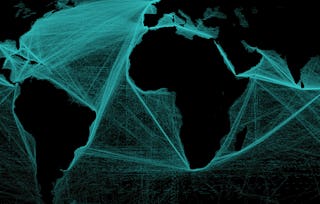Sie können die heutige Welt nicht verstehen, wenn Sie die Korruption nicht verstehen. Jeden Tag sehen wir, wie hochrangige Regierungsbeamte zurücktreten, Regierungen wechseln, Hunderttausende von Menschen auf Plätzen stehen, Schilder hochhalten und oft ihr Leben riskieren, um gegen die Korruption in der Welt zu protestieren. Für die Gesundheit unserer Gesellschaften ist es von entscheidender Bedeutung, zu verstehen, wogegen die Menschen protestieren. Wir wollen die Korruption verstehen. In diesem Kurs lernen Sie, was Korruption ist, welche Ursachen sie hat, welche Auswirkungen sie hat und wie man sie kontrollieren kann. Wir werden dies aus einer globalen Perspektive anhand von Beispielen aus der ganzen Welt behandeln. Wir werden auch über Korruption aus der Perspektive von Ländern, Regierungen, Unternehmen, Bürgern und den Menschen innerhalb dieser Einheiten sprechen. Am Ende dieses Kurses werden Sie ein besseres Verständnis dafür haben, warum sich die Welt auf dem Weg der Korruption verändert. Wenn Sie in der Lage sind, innerhalb Ihrer jeweiligen Einheit Änderungen vorzunehmen, um Entscheidungen über Korruption zu treffen, werden Sie in der Lage sein, bessere Entscheidungen zu treffen.

Korruption
Dieser Kurs ist Teil von Spezialisierung für Business-Strategien für eine bessere Welt

Dozent: Philip Nichols
18.661 bereits angemeldet
Bei enthalten
550 Bewertungen
Kompetenzen, die Sie erwerben
- Kategorie: Sozialwissenschaften
- Kategorie: Analyse
- Kategorie: Wirtschaft, Politik und Sozialkunde
- Kategorie: Geschäftsethik
- Kategorie: Governance
- Kategorie: Politische Analyse
- Kategorie: Politische Wissenschaften
- Kategorie: Soziale Auswirkungen
- Kategorie: Wirtschaftliche Entwicklung
- Kategorie: Fallstudien
- Kategorie: Psychologie
- Kategorie: Ethische Standards und Verhaltensweisen
- Kategorie: Studien zur Führungsqualität
- Kategorie: Sozioökonomie
- Kategorie: Recht, Regulierung und Compliance
- Der Fähigkeiten-Abschnitt ist eingeklappt. 9 von 15 Fähigkeiten werden angezeigt.
Wichtige Details

Zu Ihrem LinkedIn-Profil hinzufügen
Erfahren Sie, wie Mitarbeiter führender Unternehmen gefragte Kompetenzen erwerben.

Erweitern Sie Ihre Fachkenntnisse
- Lernen Sie neue Konzepte von Branchenexperten
- Gewinnen Sie ein Grundverständnis bestimmter Themen oder Tools
- Erwerben Sie berufsrelevante Kompetenzen durch praktische Projekte
- Erwerben Sie ein Berufszertifikat zur Vorlage

In diesem Kurs gibt es 4 Module
Korruption betrifft uns alle und Millionen von Menschen auf der ganzen Welt protestieren jeden Tag dagegen. Was ist Korruption? Wie können wir sie erkennen, wenn wir sie sehen? Dieses Modul soll Ihnen sowohl die Definition als auch die wichtigsten Komponenten von Korruption näher bringen. Sie lernen die allgemeinen und rechtlichen Definitionen von Korruption kennen, erfahren, wie man sie mit dem Corruptions Perceptions Index messen kann, untersuchen die Geschichte der Korruption und bewerten, wo Korruption in der Welt vorkommt. Außerdem lernen Sie drei wichtige Theorien kennen, die versuchen, die aktuelle "Eruption der Korruption" zu erklären, mit der wir heute konfrontiert sind. Am Ende dieses Moduls werden Sie in der Lage sein zu erklären, was Korruption ist, wie sie gemessen wird, welche Kosten durch Korruption entstehen und wie sich Korruption ausbreitet, so dass Sie beginnen können, Korruption dort zu erkennen und zu messen, wo sie Sie betrifft.
Das ist alles enthalten
4 Videos1 Lektüre2 Aufgaben1 Diskussionsthema
In diesem Modul werden Sie die weitreichenden Auswirkungen der Korruption erforschen, einschließlich ihrer wirtschaftlichen, sozialen und psychologischen Kosten. Sie erfahren, wie Korruption zur informellen Schaffung von Parallelinstitutionen wie Kredithai und Schwarzmarkt führt und welche Rolle Entscheidungsträger bei der Verbreitung von Korruption spielen. Sie werden auch erfahren, wie das Vertrauen gefährdet wird und wie dieser Vertrauensverlust die wirtschaftliche und soziale Entwicklung hemmt. Sie werden die sozialen Kosten der Korruption untersuchen, einschließlich der Verschlechterung der Infrastruktur und der Umweltqualität, des Anstiegs von Terrorismus und Kindersterblichkeit und anderer Bedrohungen der menschlichen Sicherheit. Am Ende dieses Moduls werden Sie in der Lage sein, die umfassenden Auswirkungen der Korruption zu skizzieren, so dass Sie Strategien zu deren Bekämpfung festlegen können.
Das ist alles enthalten
4 Videos1 Lektüre2 Aufgaben
Dieses Modul soll Ihnen helfen, die Ethik hinter der Korruption durch externe und interne Beziehungen zu erforschen. Sie erfahren etwas über die zeitlichen und monetären Kosten der Korruption, über die Perspektiven der Vorteile von Bestechung und über die Merkmale eines starken ethischen Klimas. Sie werden auch lernen, wie Sie die indirekten Kosten der Korruption ermitteln können, einschließlich derer, die leicht vorhersehbar sind, wie Geldstrafen und Vergleiche, und derer, die schwerer zu quantifizieren sind, wie die Auswirkungen auf den Ruf einer Person. Am Ende dieses Moduls werden Sie in der Lage sein, Korruption als Teil einer Beziehung zu definieren, die Kosten der Korruption für diese Beziehungen zu umreißen und die vorhersehbaren und unvorhersehbaren Sanktionen zu kategorisieren, die korrupten Unternehmen auferlegt werden.
Das ist alles enthalten
4 Videos1 Lektüre2 Aufgaben
In diesem Modul lernen Sie die wichtigsten Theorien über die Kontrolle von Korruption kennen. Sie werden untersuchen, ob Korruption kontrolliert werden kann oder nicht. Dann werden Sie die verschiedenen Arten der Korruptionskontrolle untersuchen: Unternehmen, Branchen und Staaten (organisierte Gesellschaften). Sie werden etwas über Probleme mit Versicherungen, Plattformen für den Austausch und Zertifizierungsprogramme als einige Methoden der Kontrolle erfahren. Sie werden sich ansehen, welche Schritte organisierte Gesellschaften unternommen haben, um die Korruption zu kontrollieren, einschließlich des Beispiels eines Landes, das einst die sauberste Regierung der Welt hatte. Am Ende dieses Kurses werden Sie in der Lage sein, die erlernten Prinzipien anzuwenden, indem Sie die Arbeit Ihrer Kollegen in einer Peer Review bewerten. Sie werden eine Korruptionsanalyse erstellen, in der Sie einen realen Korruptionsfall, der sich in den letzten 12-18 Monaten irgendwo auf der Welt ereignet hat, identifizieren und analysieren.
Das ist alles enthalten
4 Videos2 Lektüren1 Aufgabe1 peer review
Erwerben Sie ein Karrierezertifikat.
Fügen Sie dieses Zeugnis Ihrem LinkedIn-Profil, Lebenslauf oder CV hinzu. Teilen Sie sie in Social Media und in Ihrer Leistungsbeurteilung.
Dozent

Mehr von Governance und Gesellschaft entdecken
 Status: Kostenloser Testzeitraum
Status: Kostenloser TestzeitraumUniversity of Pennsylvania
 Status: Vorschau
Status: VorschauCoursera
 Status: Vorschau
Status: VorschauUniversity of Manchester
 Status: Kostenlos
Status: KostenlosPrinceton University
Warum entscheiden sich Menschen für Coursera für ihre Karriere?

Felipe M.

Jennifer J.

Larry W.

Chaitanya A.
Bewertungen von Lernenden
- 5 stars
74,18 %
- 4 stars
20 %
- 3 stars
4,36 %
- 2 stars
1,27 %
- 1 star
0,18 %
Zeigt 3 von 550 an
Geprüft am 17. Juni 2017
For a forensic professional like me, at a nascent stage in my career, this course is a stepping stone. Wonderful material and final assignment.
Geprüft am 2. Aug. 2020
Very detailed and presented in an easy to follow manner with many examples and stories to help the learners better understand. Thank you
Geprüft am 4. Dez. 2017
Superb course. I learned about the cause and the effects of corruption. As a forensic investigator, this helps me in understanding the causes of corruption and financial crimes. Thank you.

Neue Karrieremöglichkeiten mit Coursera Plus
Unbegrenzter Zugang zu 10,000+ Weltklasse-Kursen, praktischen Projekten und berufsqualifizierenden Zertifikatsprogrammen - alles in Ihrem Abonnement enthalten
Bringen Sie Ihre Karriere mit einem Online-Abschluss voran.
Erwerben Sie einen Abschluss von erstklassigen Universitäten – 100 % online
Schließen Sie sich mehr als 3.400 Unternehmen in aller Welt an, die sich für Coursera for Business entschieden haben.
Schulen Sie Ihre Mitarbeiter*innen, um sich in der digitalen Wirtschaft zu behaupten.
Häufig gestellte Fragen
Um Zugang zu den Kursmaterialien und Aufgaben zu erhalten und um ein Zertifikat zu erwerben, müssen Sie die Zertifikatserfahrung erwerben, wenn Sie sich für einen Kurs anmelden. Sie können stattdessen eine kostenlose Testversion ausprobieren oder finanzielle Unterstützung beantragen. Der Kurs kann stattdessen die Option "Vollständiger Kurs, kein Zertifikat" anbieten. Mit dieser Option können Sie alle Kursmaterialien einsehen, die erforderlichen Bewertungen abgeben und eine Abschlussnote erhalten. Dies bedeutet auch, dass Sie kein Zertifikat erwerben können.
Wenn Sie sich für den Kurs einschreiben, erhalten Sie Zugang zu allen Kursen der Spezialisierung, und Sie erhalten ein Zertifikat, wenn Sie die Arbeit abgeschlossen haben. Ihr elektronisches Zertifikat wird Ihrer Seite "Leistungen" hinzugefügt - von dort aus können Sie Ihr Zertifikat ausdrucken oder Ihrem LinkedIn-Profil hinzufügen.
Ja. Für bestimmte Kurse können Sie finanzielle Unterstützung oder ein Stipendium beantragen, wenn Sie die Gebühr nicht aufbringen können. Wenn für den von Ihnen gewählten Kurs diese Möglichkeit besteht, finden Sie auf der Beschreibungsseite des Kurses einen Link, unter dem Sie einen Antrag stellen können.
Weitere Fragen
Finanzielle Unterstützung verfügbar,
¹ Einige Aufgaben in diesem Kurs werden mit AI bewertet. Für diese Aufgaben werden Ihre Daten in Übereinstimmung mit Datenschutzhinweis von Courseraverwendet.


